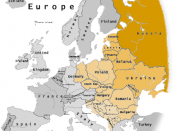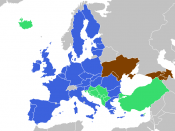When the Iron Curtain finally collapsed in late 1989, many Eastern Europeans welcomed democratic governance with open arms. With redefined policies, a redistribution of power(s), and a shift to hard currency (which would afford Eastern Europe a greater standing on the international market), democracy seemed like a blissful dream; the kind which could afford its people the luxuries which their western counterparts enjoyed. The people, with newly infused power and legitimacy were now free to collectively dictate how their given countries would be run via the power of the ballot-box. With the 'democratic revolution' however, came the realization that not only had the 50-odd year run of communism taken its toll on Eastern Europe's international standing, but also and more importantly, the environment. The sudden realization of how bad environmental degradation had spread throughout specific regions mimicked the US's environmental reawakening of the 1960's (sparked by the Cuyahoga River catching fire and the publishing of 'Silent Spring' by Rachel Parsons).
This hard to swallow situation left much of the former communist citizenry in an uproar, demanding their newly democratic governments address the issue as quickly as possible. But in the early stages of democratic transition, governments didn't possess the means to address these issues as they were primarily concerned with their pending social and political reform. Thus we saw the environment taking a back seat to progress once again. But what longstanding damage had already been done? What actions would Eastern European governments have to take to rectify the years of environmental neglect? And furthermore, who would be the key players in shaping European environment for the years to come?
When communism spread its influence to much of Eastern Europe in 1949, there
was little to no real regard for the environment. Interested in the welfare of the party alone,


